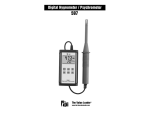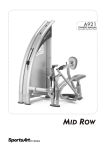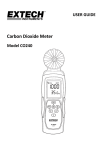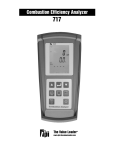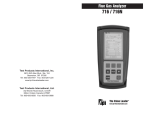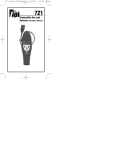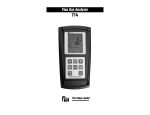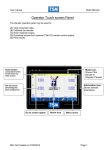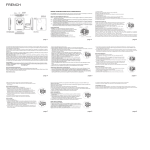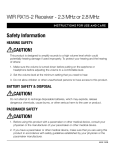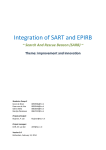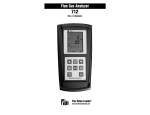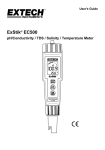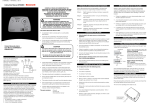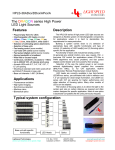Download 1010 Manual 042909.qxd - Gas & Environmental Services Ltd
Transcript
Indoor Air Quality Meter 1010 Rev. 2.x / 3.x Meters The Value Leader www.tpi-thevalueleader.com TM Contents 1. Introduction 2. General Overview 3. 3.1 3.2 3.3 Familiarization Front View Soft Keys Back View 4. 4.1 4.2 4.3 4.4 4.5 4.6 4.7 Operation Turning On & Off / Performing a Test / Main Display Selecting Temperature Units Ambient / Dew Point / Wet Bulb Temperature Display Temperature / Clock Display Modes Activating the Backlight Setting Date and Time Setting CO Alarm Level 5. 5.1 5.2 Calculating % Outside Air % Outside Air (Temperature) % Outside Air (Carbon Dioxide) 6. Data Logging 7. Retrieving Logged Data 8. Technical Specifications 9. 9.1 9.2 Maintenance Battery Replacement Service 10. Technical Information 1. Introduction Thank you for purchasing TPI brand products. The TPI 1010 Indoor Air Quality (IAQ) Meter is a state of the art, easy to use tester designed to provide you with the necessary measurements to monitor and make adjustments to air handling devices. The instrument is ruggedly constructed and comes with a 3 Year unit and 2 Year sensor Guarantee. 2. General Overview The 1010 IAQ meter uses state of the art sensors to measure humidity, carbon monoxide (CO), carbon dioxide (CO2), and temperature. The CO and CO2 sensors in your meter will need to be replaced periodically and calibration is recommended once every year. The CO sensor is electrochemical and this type of sensor is always active once installed in the unit. Therefore the time the unit is off and not being used must be taken into account when determining sensor life. The sensors in your analyzer are warranted for two years. This warranty does not cover sensors damaged through misuse of the meter. You should keep battery power applied to your sensors at all times. The following guidelines will help prevent damage to your sensors: Always store your unit in a place where the temperature does not get down to or below freezing. Always maintain battery power to the sensors. When the batteries get low replace them as soon as possible. Never allow foreign objects or material to enter the sensor holes, damage to the sensor may result. Never over saturate your sensors by performing tests on equipment with gas levels beyond the capability of you analyzer. Contents 1. Introduction 2. General Overview 3. 3.1 3.2 3.3 Familiarization Front View Soft Keys Back View 4. 4.1 4.2 4.3 4.4 4.5 4.6 4.7 Operation Turning On & Off / Performing a Test / Main Display Selecting Temperature Units Ambient / Dew Point / Wet Bulb Temperature Display Temperature / Clock Display Modes Activating the Backlight Setting Date and Time Setting CO Alarm Level 5. 5.1 5.2 Calculating % Outside Air % Outside Air (Temperature) % Outside Air (Carbon Dioxide) 6. Data Logging 7. Retrieving Logged Data 8. Technical Specifications 9. 9.1 9.2 Maintenance Battery Replacement Service 10. Technical Information 1. Introduction Thank you for purchasing TPI brand products. The TPI 1010 Indoor Air Quality (IAQ) Meter is a state of the art, easy to use tester designed to provide you with the necessary measurements to monitor and make adjustments to air handling devices. The instrument is ruggedly constructed and comes with a 3 Year unit and 2 Year sensor Guarantee. 2. General Overview The 1010 IAQ meter uses state of the art sensors to measure humidity, carbon monoxide (CO), carbon dioxide (CO2), and temperature. The CO and CO2 sensors in your meter will need to be replaced periodically and calibration is recommended once every year. The CO sensor is electrochemical and this type of sensor is always active once installed in the unit. Therefore the time the unit is off and not being used must be taken into account when determining sensor life. The sensors in your analyzer are warranted for two years. This warranty does not cover sensors damaged through misuse of the meter. You should keep battery power applied to your sensors at all times. The following guidelines will help prevent damage to your sensors: Always store your unit in a place where the temperature does not get down to or below freezing. Always maintain battery power to the sensors. When the batteries get low replace them as soon as possible. Never allow foreign objects or material to enter the sensor holes, damage to the sensor may result. Never over saturate your sensors by performing tests on equipment with gas levels beyond the capability of you analyzer. General Overview (Continued) 3. Familiarization 3.1 Front View This manual will guide you through the functions of the TPI 1010 which will give you many years of reliable service. CO2 Sensor Location Humidity & Temperature Sensor Location Your TPI 1010 Indoor Air Quality meter comes complete with the following standard accessories: • • • • • TPI 1010 Instrument Protective Rubber Boot (A800) Soft Carrying Case (A921) USB Cable & Software (A803) Instruction Manual Your TPI 1010 Indoor Air Quality meter has the following optional accessories available: • • • • • CO Sensor Location Display Protective Rubber Boot Power adapter / Battery eliminator (A804) Magnetic strap kit to hang meter (A127) Boot hook to hang meter (A103) Replacement Software only (A802) Replacement USB cable only (A801) Keypad ( ) Denotes part number Power Adapter USB Port Sensor Locations: Places where the CO, CO2, and Humidity sensors are located and protected. Display : Large 4 Parameter Backlit LCD Display. Protective Rubber Boot Provides protection to meter housing and sensors. Keypad Selects all available functions USB Port Location for connection of USB cable for PC com munication. Power Adapter Socket Location to connect power adapter. General Overview (Continued) 3. Familiarization 3.1 Front View This manual will guide you through the functions of the TPI 1010 which will give you many years of reliable service. CO2 Sensor Location Humidity & Temperature Sensor Location Your TPI 1010 Indoor Air Quality meter comes complete with the following standard accessories: • • • • • TPI 1010 Instrument Protective Rubber Boot (A800) Soft Carrying Case (A921) USB Cable & Software (A803) Instruction Manual Your TPI 1010 Indoor Air Quality meter has the following optional accessories available: • • • • • CO Sensor Location Display Protective Rubber Boot Power adapter / Battery eliminator (A804) Magnetic strap kit to hang meter (A127) Boot hook to hang meter (A103) Replacement Software only (A802) Replacement USB cable only (A801) Keypad ( ) Denotes part number Power Adapter USB Port Sensor Locations: Places where the CO, CO2, and Humidity sensors are located and protected. Display : Large 4 Parameter Backlit LCD Display. Protective Rubber Boot Provides protection to meter housing and sensors. Keypad Selects all available functions USB Port Location for connection of USB cable for PC com munication. Power Adapter Socket Location to connect power adapter. 3.2 Soft Keys 3.3 Back View On / Off key - Used to turn the IAQ meter on or off. Press to turn on, press and hold to turn off. Up Arrow key - Used to select and change parameters. Also used to cycle through dew point and wet bulb temperatures from the main display. Left Arrow key - Used to select and change parameters. Hanger Hole Right Arrow key - Used to select and change parameters. Down Arrow key - Used to select and change parameters. Enter key - Used to activate % outside air mode. Also used to accept parameter changes. Mode key - Used to activate and deactivate data logging mode. Press and hold to activate or deactivate logging. Tilt Stand Backlight key - Used to turn the display backlight on and off. T/C key - Used to switch the bottom display between temperature / humidity and time display modes. Battery Cover Screw Unit key - Used switch the bottom temperature display between Fahrenheit and Celsius modes. Hanger Hole: Use to hang instrument for hands free operation. Can be used with A127 magnetic strap kit or A103 hook. Tilt Stand: Use to stand instrument on a table. Batter Cover Screw: Loosen this screw and open cover to access batteries. 3.2 Soft Keys 3.3 Back View On / Off key - Used to turn the IAQ meter on or off. Press to turn on, press and hold to turn off. Up Arrow key - Used to select and change parameters. Also used to cycle through dew point and wet bulb temperatures from the main display. Left Arrow key - Used to select and change parameters. Hanger Hole Right Arrow key - Used to select and change parameters. Down Arrow key - Used to select and change parameters. Enter key - Used to activate % outside air mode. Also used to accept parameter changes. Mode key - Used to activate and deactivate data logging mode. Press and hold to activate or deactivate logging. Tilt Stand Backlight key - Used to turn the display backlight on and off. T/C key - Used to switch the bottom display between temperature / humidity and time display modes. Battery Cover Screw Unit key - Used switch the bottom temperature display between Fahrenheit and Celsius modes. Hanger Hole: Use to hang instrument for hands free operation. Can be used with A127 magnetic strap kit or A103 hook. Tilt Stand: Use to stand instrument on a table. Batter Cover Screw: Loosen this screw and open cover to access batteries. 4. Operation 4.2 Selecting Temperature Units Pressing the 4.1 Turning On & Off / Performing a Test / Main Display Always: - Turn the 1010 on outside of the area to be tested. Make sure the unit is in fresh air (no carbon monoxide present) prior to turning on. This will allow the CO sensor to set to zero properly. key switches the temperature display between °F and °C. 4.3 Ambient / Dew Point / Wet Bulb Temperature Display Repeatedly pressing the key from the main display cycles through dew point temperature, wet bulb temperature, and ambient temperature displays. Press the key and the 1010 will begin a 30 second countdown. During this time the 1010 performs a self diagnostic and sets the CO sensor to zero. Once the countdown ends the 1010 will display CO2, CO, Temperature, and Humidity. Enter the area to be tested, the measured values will be displayed. Carbon dioxide (CO2) in parts per million (ppm) is displayed at the top, carbon monoxide (CO) in parts per million (ppm) is displayed in the middle, temperature in °F or °C (selectable), and humidity in percent are displayed at the bottom of the main display. Ambient Temperature Dew Point Temperature Indicated by “DP” in the display Wet Bulb Temperature Indicated by “WB” in the display 4.4 Temperature / Clock Display Modes The battery indicator is located at the bottom left of the display. When the batteries become low they must be replaced to maintain proper operation. Carbon dioxide (CO2) Carbon monoxide (CO) Battery indicator To turn the 1010 off, press and hold the Temperature Humidity key down until the 1010 turns off. If 30ppm or more CO is measured the 1010 will beep and the display will flash red as a warning. This alarm point is adjustable. Additional functions can be activated during testing. Please see next sections. Pressing the key from the main display cycles between temperature and clock display. To set the clock please refer to section 4.6. 4.5 Activating the Backlight Pressing the key turns the display backlight on and off. Power consumption is much higher when the backlight is activated. The backlight will automatically turn off 30 seconds after it is activated. To conserve battery life the backlight should only be used when necessary. 4. Operation 4.2 Selecting Temperature Units Pressing the 4.1 Turning On & Off / Performing a Test / Main Display Always: - Turn the 1010 on outside of the area to be tested. Make sure the unit is in fresh air (no carbon monoxide present) prior to turning on. This will allow the CO sensor to set to zero properly. key switches the temperature display between °F and °C. 4.3 Ambient / Dew Point / Wet Bulb Temperature Display Repeatedly pressing the key from the main display cycles through dew point temperature, wet bulb temperature, and ambient temperature displays. Press the key and the 1010 will begin a 30 second countdown. During this time the 1010 performs a self diagnostic and sets the CO sensor to zero. Once the countdown ends the 1010 will display CO2, CO, Temperature, and Humidity. Enter the area to be tested, the measured values will be displayed. Carbon dioxide (CO2) in parts per million (ppm) is displayed at the top, carbon monoxide (CO) in parts per million (ppm) is displayed in the middle, temperature in °F or °C (selectable), and humidity in percent are displayed at the bottom of the main display. Ambient Temperature Dew Point Temperature Indicated by “DP” in the display Wet Bulb Temperature Indicated by “WB” in the display 4.4 Temperature / Clock Display Modes The battery indicator is located at the bottom left of the display. When the batteries become low they must be replaced to maintain proper operation. Carbon dioxide (CO2) Carbon monoxide (CO) Battery indicator To turn the 1010 off, press and hold the Temperature Humidity key down until the 1010 turns off. If 30ppm or more CO is measured the 1010 will beep and the display will flash red as a warning. This alarm point is adjustable. Additional functions can be activated during testing. Please see next sections. Pressing the key from the main display cycles between temperature and clock display. To set the clock please refer to section 4.6. 4.5 Activating the Backlight Pressing the key turns the display backlight on and off. Power consumption is much higher when the backlight is activated. The backlight will automatically turn off 30 seconds after it is activated. To conserve battery life the backlight should only be used when necessary. 4.6 Setting Date and Time 4.7 Setting CO Alarm Level 1) Starting with the 1010 turned off, press and hold down the press and hold down the key then The 1010 is equipped with an audible and visual alarm for carbon monoxide. The alarm level is factory set at 30ppm. When CO above this level is measured, the 1010 will beep and the display will flash red. key until two beeps are heard and the time / date The alarm level is adjustable and can be set from 10ppm to 500ppm. screen is displayed. 1) With the 1010 turned on, press and hold down the until the CO alarm screen is displayed. and keys Year Month / Day CO alarm level in ppm Hour / Minutes (24 hour clock, HH:MM) 2) Using the Arrow keys, set the year. Once the year is set, press 3) Using the Arrow keys, set the month. Once the month is set, press 4) Using the Arrow keys, set the day. Once the day is set, press 5) Using the Arrow keys, set the hour. Once the hour is set press 6) Using the Arrow keys set the minutes. Once minutes is set, press The 1010 will return to normal operation. Using the Arrow keys set the alarm point to the desired level. The keys increase or decrease the value. keys select the digit and the key to return to normal Once the desired alarm point is set, press the operation. 4.6 Setting Date and Time 4.7 Setting CO Alarm Level 1) Starting with the 1010 turned off, press and hold down the press and hold down the key then The 1010 is equipped with an audible and visual alarm for carbon monoxide. The alarm level is factory set at 30ppm. When CO above this level is measured, the 1010 will beep and the display will flash red. key until two beeps are heard and the time / date The alarm level is adjustable and can be set from 10ppm to 500ppm. screen is displayed. 1) With the 1010 turned on, press and hold down the until the CO alarm screen is displayed. and keys Year Month / Day CO alarm level in ppm Hour / Minutes (24 hour clock, HH:MM) 2) Using the Arrow keys, set the year. Once the year is set, press 3) Using the Arrow keys, set the month. Once the month is set, press 4) Using the Arrow keys, set the day. Once the day is set, press 5) Using the Arrow keys, set the hour. Once the hour is set press 6) Using the Arrow keys set the minutes. Once minutes is set, press The 1010 will return to normal operation. Using the Arrow keys set the alarm point to the desired level. The keys increase or decrease the value. keys select the digit and the key to return to normal Once the desired alarm point is set, press the operation. 5.2 % Outside Air (Carbon Dioxide) 5. Calculating % Outside Air HVAC systems use a combination of outside air, supply air, and return air to maintain consistent and comfortable air quality. The 1010 can calculate outside air either by measuring temperature or by measuring CO2. The formula used to calculate % outside air is: key about 2 seconds until “t-0” is To activate % outside air mode, press the displayed in the middle display area. Press and hold the key until “C-0” is displayed. 1) Place the sensor of the 1010 perpendicular to the “Return” air flow. When the reading stabilizes press the key and capture the return air temperature, "C-1" is displayed. Percent outside air can be calculated using either temperature or carbon dioxide. 2) Place the sensor of the 1010 perpendicular to the “Supply” air flow. When the reading stabilizes press the key and capture the supply air temperature, "C-2" is displayed. 5.1 % Outside Air (Temperature) 3) Place the sensor of the 1010 perpendicular to the “Outside” air flow. When the reading stabilizes press the key and capture the outside air temperature, "C-3" is displayed. To activate % outside air mode, press the displayed in the middle display area. key about 2 seconds until “t-0” is 1) Place the sensor of the 1010 perpendicular to the “Return” air flow. When the reading stabilizes press the key and capture the return air temperature, "t-1" is displayed. 2) Place the sensor of the 1010 perpendicular to the “Supply” air flow. When the reading stabilizes press the key and capture the supply air temperature, "t-2" is displayed. 3) Place the sensor of the 1010 perpendicular to the “Outside” air flow. When the reading stabilizes press the key and capture the outside air temperature, "t-3" is displayed. 4) Press the key, "t =" will be displayed and the calculated percent outside air will be displayed at the top of the display. 5) If you want to perform this measurement again, press the return to step 1. key once and 6) To exit and return to normal operation, press and hold the key until “C-0” is displayed. Press and hold the key until a beep is heard and the 1010 returns to normal operation. 4) Press the key, "C =" will be displayed and the calculated percent outside air will be displayed at the top of the display. 5) If you want to perform this measurement again, press the return to step 1. key once and 6) To exit and return to normal operation, press and hold the a beep is heard and the 1010 returns to normal operation. key until 5.2 % Outside Air (Carbon Dioxide) 5. Calculating % Outside Air HVAC systems use a combination of outside air, supply air, and return air to maintain consistent and comfortable air quality. The 1010 can calculate outside air either by measuring temperature or by measuring CO2. The formula used to calculate % outside air is: key about 2 seconds until “t-0” is To activate % outside air mode, press the displayed in the middle display area. Press and hold the key until “C-0” is displayed. 1) Place the sensor of the 1010 perpendicular to the “Return” air flow. When the reading stabilizes press the key and capture the return air temperature, "C-1" is displayed. Percent outside air can be calculated using either temperature or carbon dioxide. 2) Place the sensor of the 1010 perpendicular to the “Supply” air flow. When the reading stabilizes press the key and capture the supply air temperature, "C-2" is displayed. 5.1 % Outside Air (Temperature) 3) Place the sensor of the 1010 perpendicular to the “Outside” air flow. When the reading stabilizes press the key and capture the outside air temperature, "C-3" is displayed. To activate % outside air mode, press the displayed in the middle display area. key about 2 seconds until “t-0” is 1) Place the sensor of the 1010 perpendicular to the “Return” air flow. When the reading stabilizes press the key and capture the return air temperature, "t-1" is displayed. 2) Place the sensor of the 1010 perpendicular to the “Supply” air flow. When the reading stabilizes press the key and capture the supply air temperature, "t-2" is displayed. 3) Place the sensor of the 1010 perpendicular to the “Outside” air flow. When the reading stabilizes press the key and capture the outside air temperature, "t-3" is displayed. 4) Press the key, "t =" will be displayed and the calculated percent outside air will be displayed at the top of the display. 5) If you want to perform this measurement again, press the return to step 1. key once and 6) To exit and return to normal operation, press and hold the key until “C-0” is displayed. Press and hold the key until a beep is heard and the 1010 returns to normal operation. 4) Press the key, "C =" will be displayed and the calculated percent outside air will be displayed at the top of the display. 5) If you want to perform this measurement again, press the return to step 1. key once and 6) To exit and return to normal operation, press and hold the a beep is heard and the 1010 returns to normal operation. key until 6. Data Logging 7. Retrieving Logged Data key until the logging setup To activate data logging press and hold down the screen is displayed. Once the logging function is activated all preciously logged data is written over. To retrieve logged data the USB cable and PC software (both supplied) must be used. Install the PC software on your PC and open it. Connect the 1010 to the PC using the USB cable. Click on the connect to PC button in the software window. The software can be used to retrieve logged data and for real time monitoring. COM port setting is: 1) INT is displayed at the top to indicate the 1010 is waiting for the logging interval to be set. The logging interval tells the 1010 how often to sample. For example, a logging interval of 10 seconds (00:10) means the 1010 will log a reading every 10 seconds. The bottom indicates the current logging interval in minutes and seconds (MM:SS) or hours and minutes (HH:MM). Flashing “SEC” in the display indicates the last two digits are seconds and a flashing “MIN” in the display indicates the last two digits are minutes. In seconds mode the time is adjustable from 1 sec to 59 min 59 sec. In the minutes mode the time is adjustable from 1 min to keys switches between the two time 23 hr 59 min. Pressing the modes. key and time digits will flash. Using 2) Once the time mode is set press the the Arrow keys set the interval to the desired level. The keys select the digit and the keys increase or decrease the value. 3) Once the seconds have been entered, press the key to move to min / hr. 4) Using the Arrow keys set the interval to the desired level. The keys select the digit and the keys increase or decrease the value. key and the 1010 will return to 5) Once the logging interval is set press the the main display and “LOG” will flash indicating the logging function is active. 6) To deactivate data logging press and hold down the no longer flashing. key until “LOG” is For data retrieval please see the next section on how to retrieve logged data. Baud rate: 19200 Parity: None Data Bits: 8 Stop Bit: 1 6. Data Logging 7. Retrieving Logged Data key until the logging setup To activate data logging press and hold down the screen is displayed. Once the logging function is activated all preciously logged data is written over. To retrieve logged data the USB cable and PC software (both supplied) must be used. Install the PC software on your PC and open it. Connect the 1010 to the PC using the USB cable. Click on the connect to PC button in the software window. The software can be used to retrieve logged data and for real time monitoring. COM port setting is: 1) INT is displayed at the top to indicate the 1010 is waiting for the logging interval to be set. The logging interval tells the 1010 how often to sample. For example, a logging interval of 10 seconds (00:10) means the 1010 will log a reading every 10 seconds. The bottom indicates the current logging interval in minutes and seconds (MM:SS) or hours and minutes (HH:MM). Flashing “SEC” in the display indicates the last two digits are seconds and a flashing “MIN” in the display indicates the last two digits are minutes. In seconds mode the time is adjustable from 1 sec to 59 min 59 sec. In the minutes mode the time is adjustable from 1 min to keys switches between the two time 23 hr 59 min. Pressing the modes. key and time digits will flash. Using 2) Once the time mode is set press the the Arrow keys set the interval to the desired level. The keys select the digit and the keys increase or decrease the value. 3) Once the seconds have been entered, press the key to move to min / hr. 4) Using the Arrow keys set the interval to the desired level. The keys select the digit and the keys increase or decrease the value. key and the 1010 will return to 5) Once the logging interval is set press the the main display and “LOG” will flash indicating the logging function is active. 6) To deactivate data logging press and hold down the no longer flashing. key until “LOG” is For data retrieval please see the next section on how to retrieve logged data. Baud rate: 19200 Parity: None Data Bits: 8 Stop Bit: 1 8. Technical Specifications 9. Maintenance Function CO2 Range Accuracy 0 to 5000ppm 50°F~104°F: ±3% of rdg+75ppm <50°F, >104°F: ±5% of rdg+75ppm Temperature -5°F to 140°F ±2°F -20°C to 60°C ±1°C It is recommended that the instrument be calibrated every 12 months. Please consult Test Products International for further details (800) 368-5719. 9.1 Battery Replacement When the batteries become low they will require replacement. Dew Point Temperature -47°F to 135°F Calculation -44°C to 57°C Wet Bulb Temperature 3°F to 135°F Calculation -16°C to 57°C Relative Humidity 5% to 95% ±2% RH CO 0 to 500ppm ±3ppm or ±5% of rdg whichever is greater % Outside Air 0 to 100% Calculation Data Logging: Up to 4,000 samples 1 sec to 23hr 59min interval. Display Type: 3 line with annunciators and backlight CO Alarm: Audible and visual, selectable level (factory default 30ppm) Operating Temperature & Humidity CO and CO2: 14°F to 122°F (-10°C to 50°C) All Other Function: -4°F to 140°F (-20°C to 60°C) Humidity 15 ~ 95% non-condensing Storage Temperature: -4°F to 140°F (-20°C to 60°C) Power supply 3 AA battery( 4.5V) AC/DC adapter 5Vout (Center positive) Battery Life: 40 hours typical without backlight Output: Serial output via USB connection 1. Turn the meter over so the back is facing you. 2. Loosen the screw holding down the battery cover located under the tilt stand. 3. Lift the tilt stand up and remove the battery cover. 4. Replace the batteries (3 x AA Alkaline) and install the cover and tighten the screw. 9.2 Service To obtain warranty and non-warranty performance or maintenance on your analyzer: - Include with the product your name, address, phone number, written description of the problem and proof of purchase date. Carefully package and return to: TPI / Attn. Repair 9615 SW Allen Blvd. Suite 104 Beaverton, OR 97005 8. Technical Specifications 9. Maintenance Function CO2 Range Accuracy 0 to 5000ppm 50°F~104°F: ±3% of rdg+75ppm <50°F, >104°F: ±5% of rdg+75ppm Temperature -5°F to 140°F ±2°F -20°C to 60°C ±1°C It is recommended that the instrument be calibrated every 12 months. Please consult Test Products International for further details (800) 368-5719. 9.1 Battery Replacement When the batteries become low they will require replacement. Dew Point Temperature -47°F to 135°F Calculation -44°C to 57°C Wet Bulb Temperature 3°F to 135°F Calculation -16°C to 57°C Relative Humidity 5% to 95% ±2% RH CO 0 to 500ppm ±3ppm or ±5% of rdg whichever is greater % Outside Air 0 to 100% Calculation Data Logging: Up to 10,000 samples 1 sec to 23hr 59min interval. Display Type: 3 line with annunciators and backlight CO Alarm: Audible and visual, selectable level (factory default 30ppm) Operating Temperature & Humidity CO and CO2: 14°F to 122°F (-10°C to 50°C) All Other Function: -4°F to 140°F (-20°C to 60°C) Humidity 15 ~ 95% non-condensing Storage Temperature: -4°F to 140°F (-20°C to 60°C) Power supply 3 AA battery( 4.5V) AC/DC adapter 5Vout (Center positive) Battery Life: 40 hours typical without backlight Output: Serial output via USB connection 1. Turn the meter over so the back is facing you. 2. Loosen the screw holding down the battery cover located under the tilt stand. 3. Lift the tilt stand up and remove the battery cover. 4. Replace the batteries (3 x AA Alkaline) and install the cover and tighten the screw. 9.2 Service To obtain warranty and non-warranty performance or maintenance on your analyzer: - Include with the product your name, address, phone number, written description of the problem and proof of purchase date. Carefully package and return to: TPI / Attn. Repair 9615 SW Allen Blvd. Suite 104 Beaverton, OR 97005 10. Technical Information 10. Error Codes & Troubleshooting CO2 Sensor Error % Outside Air - HVAC systems use a combination of outside air, supply air, and return air to maintain consistent and comfortable air quality. The 1010 can calculate outside air either by measuring temperature or by measuring CO2. The formula for % Outside Air is: If too little outdoor air enters a home, pollutants can accumulate to levels that can pose health and comfort concerns. Unless they are built with special mechanical means of ventilation, homes that are designed and constructed to minimize the amount of outdoor air that can 'leak' into and out of the home may have higher pollutant levels than other homes. However, because some weather conditions can drastically reduce the amount of outdoor air that enters a home pollutants can build up even in homes that are normally considered 'leaky'. Dew Point Temperature - This is the temperature at which condensation begins Wet Bulb Temperature - This is the lowest temperature evaporating water can reach Recommended Levels by Agency Parameter Humidity IDPH1 20% - 60% Temperature 68 - 75 (winter) 73 - 79 (summer) Carbon Dioxide 1,000ppm (<800ppm preferred) Carbon Monoxide 9ppm ASHRAE2 30% - 60% OSHA PEL3 ACGIH TLV4 N/A N/A 68 - 75 (winter) N/A 73 - 79 (summer) 1,000ppm 5,000ppm N/A 9ppm 25ppm 50ppm 5,000ppm N/A-Not Applicable or Not Established 1 Illinois Department of Public Health (2009) American Society of Heating, Refrigerating and Air Conditioning Engineers 3 Occupational Safety and Health Administration Permissible Exposure Limit -- this level is a time-weighted average and is an enforceable standard that must not be exceeded during any eight-hour work shift of a 40-hour work week. 4 American Conference of Governmental Industrial Hygienist Threshold Limit Value -- this level is a recommended time-weighted average upper limit exposure concentration for a normal eight to 10-hour workday and a 40-hour work week. 2 If the CO2 sensor fails to initialize or is faulty the 1010 will display an error code. Try turning the 1010 off and on again. If it displays the error code again the 1010 is in need of service. Please return your instrument to TPI. See section 9.2 for instructions on returning your meter. CO Sensor Error If the CO sensor fails to initialize or is faulty the 1010 will display an error code. Try turning the 1010 off and on again. If it displays the error code again the 1010 is in need of service. Please return your instrument to TPI. See section 9.2 for instructions on returning your meter. CO Sensor Caibration Due When the last calibration date of the CO sensor is one year or older the 1010 will display a reminder that calibration is due before returning to normal operation. Please return your instrument to TPI for calibration. See section 9.2 for instructions on returning your meter. Temperature and/or Humidity Sensor Error If the temperature and/or humidity sensor fails to initialize or is faulty the 1010 will display an error code. Try turning the 1010 off and on again. If it displays the error code again the 1010 is in need of service. Please return your instrument to TPI. See section 9.2 for instructions on returning your meter. 10. Technical Information 10. Error Codes & Troubleshooting CO2 Sensor Error % Outside Air - HVAC systems use a combination of outside air, supply air, and return air to maintain consistent and comfortable air quality. The 1010 can calculate outside air either by measuring temperature or by measuring CO2. The formula for % Outside Air is: If too little outdoor air enters a home, pollutants can accumulate to levels that can pose health and comfort concerns. Unless they are built with special mechanical means of ventilation, homes that are designed and constructed to minimize the amount of outdoor air that can 'leak' into and out of the home may have higher pollutant levels than other homes. However, because some weather conditions can drastically reduce the amount of outdoor air that enters a home pollutants can build up even in homes that are normally considered 'leaky'. Dew Point Temperature - This is the temperature at which condensation begins Wet Bulb Temperature - This is the lowest temperature evaporating water can reach Recommended Levels by Agency Parameter Humidity IDPH1 20% - 60% Temperature 68 - 75 (winter) 73 - 79 (summer) Carbon Dioxide 1,000ppm (<800ppm preferred) Carbon Monoxide 9ppm ASHRAE2 30% - 60% OSHA PEL3 ACGIH TLV4 N/A N/A 68 - 75 (winter) N/A 73 - 79 (summer) 1,000ppm 5,000ppm N/A 9ppm 25ppm 50ppm 5,000ppm N/A-Not Applicable or Not Established 1 Illinois Department of Public Health (2009) American Society of Heating, Refrigerating and Air Conditioning Engineers 3 Occupational Safety and Health Administration Permissible Exposure Limit -- this level is a time-weighted average and is an enforceable standard that must not be exceeded during any eight-hour work shift of a 40-hour work week. 4 American Conference of Governmental Industrial Hygienist Threshold Limit Value -- this level is a recommended time-weighted average upper limit exposure concentration for a normal eight to 10-hour workday and a 40-hour work week. 2 If the CO2 sensor fails to initialize or is faulty the 1010 will display an error code. Try turning the 1010 off and on again. If it displays the error code again the 1010 is in need of service. Please return your instrument to TPI. See section 9.2 for instructions on returning your meter. CO Sensor Error If the CO sensor fails to initialize or is faulty the 1010 will display an error code. Try turning the 1010 off and on again. If it displays the error code again the 1010 is in need of service. Please return your instrument to TPI. See section 9.2 for instructions on returning your meter. CO Sensor Caibration Due When the last calibration date of the CO sensor is one year or older the 1010 will display a reminder that calibration is due before returning to normal operation. Please return your instrument to TPI for calibration. See section 9.2 for instructions on returning your meter. Temperature and/or Humidity Sensor Error If the temperature and/or humidity sensor fails to initialize or is faulty the 1010 will display an error code. Try turning the 1010 off and on again. If it displays the error code again the 1010 is in need of service. Please return your instrument to TPI. See section 9.2 for instructions on returning your meter. Test Products International, Inc. 9615 SW Allen Blvd., Ste. 104 Beaverton, OR 97005 Tel: 503-520-9197 Fax: 503-520-1225 www.tpi-thevalueleader.com Test Products International, Ltd. 342 Bronte Road South, Unit #9 Milton Ontario Canada L9T5B7 Tel: 905-693-8558 Fax: 905-693-0888




















